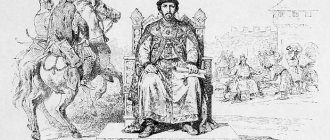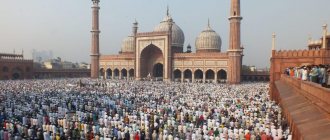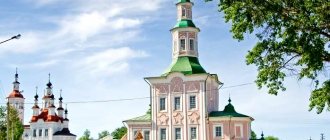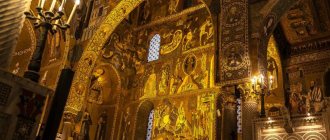Metropolitan Ignatius of Khabarovsk, in the world simply Sergei Gennadievich Pologrudov, is a bishop of the Russian Orthodox Church. Currently Metropolitan of Argentina and South America.
Sergei Gennadievich Pologrudov - currently Metropolitan of Argentina and South America
The future ruler was born in the city of Irkutsk, where he later graduated from the physics department at the university.
Ignatius was born into an ordinary family and had no intention of devoting his life to serving God.
March 25, 1956
on this day the future Bishop Ignatius was born in the city of Irkutsk
Bishop was born on March 25, 1956 in the city of Irkutsk. After graduating from school, he entered Irkutsk State University at the Faculty of Physics.
Graduated in 1978, he began to serve with the rank of lieutenant in the Armed Forces in the Baltic Military District.
From 1980 to 1983, he worked as an engineer at the electronic computing center of the East Siberian Energy Institute.
From 1983 to 1990, he became the head of the laboratory of medical cybernetics at the All-Union Scientific Center for Surgery.
In 1998, Ignatius decided to accept the Sacrament of Baptism in Lake Baikal
In 1998, he decided to be baptized in Lake Baikal. He came to the Orthodox faith under the influence of Archbishop Chrysostomos.
At that time, Ignatius was 32 years old, he remembers under whose influence he then decided to accept the Sacrament of Baptism.
“...This was the beginning of perestroika. Many flocked to the Church, including me. Then the Irkutsk diocese was headed by Archbishop - now Metropolitan - Chrysostomos...” “Hearing his sermons, I was amazed...”
Chrysostom is a bishop of the Russian Orthodox Church, currently retired.
It was he who influenced Bishop Ignatius to accept baptism and devote his life to the Lord. Following him, Ignatius left Siberia for the Holy Spirit Monastery.
In 1990, Ignatius moved to Lithuania and entered the brethren of the Holy Spirit Monastery in the city of Vilnius. There he served as a librarian, as well as a trustee and confessor of a boarding school.
This is what the Holy Spirit Monastery looks like in Vilnius. It was here that the future Bishop Ignatius moved after Irkutsk, here he performed his obediences and was elevated to the rank of deacon for the first time
Excerpt characterizing Ignatius (Pologrudov)
Pierre suddenly sighed heavily and collapsed with his heavy body on the sofa, next to Prince Andrei. - To Natasha Rostova, right? - he said. - Yes, yes, who? I would never believe it, but this feeling is stronger than me. Yesterday I suffered, I suffered, but I wouldn’t give up this torment for anything in the world. I haven't lived before. Now only I live, but I cannot live without her. But can she love me?... I'm too old for her... What aren't you saying?... - Me? I? “What did I tell you,” Pierre suddenly said, getting up and starting to walk around the room. - I always thought this... This girl is such a treasure, such... This is a rare girl... Dear friend, I ask you, don’t get smart, don’t doubt, get married, get married and get married... And I’m sure that there will be no happier person than you. - But she! - She loves you. “Don’t talk nonsense...” said Prince Andrei, smiling and looking into Pierre’s eyes. “He loves me, I know,” Pierre shouted angrily. “No, listen,” said Prince Andrei, stopping him by the hand. – Do you know what situation I’m in? I need to tell everything to someone. “Well, well, say, I’m very glad,” said Pierre, and indeed his face changed, the wrinkles smoothed out, and he joyfully listened to Prince Andrei. Prince Andrei seemed and was a completely different, new person. Where was his melancholy, his contempt for life, his disappointment? Pierre was the only person to whom he dared to speak; but he expressed to him everything that was in his soul. Either he easily and boldly made plans for a long future, talked about how he could not sacrifice his happiness for the whim of his father, how he would force his father to agree to this marriage and love her or do without his consent, then he was surprised how something strange, alien, independent of him, influenced by the feeling that possessed him. “I wouldn’t believe anyone who told me that I could love like that,” said Prince Andrei. “This is not at all the feeling that I had before.” The whole world is divided for me into two halves: one - she and there is all the happiness of hope, light; the other half is everything where she is not, there is all despondency and darkness... “Darkness and gloom,” repeated Pierre, “yes, yes, I understand that.” – I can’t help but love the world, it’s not my fault. And I'm very happy. You understand me? I know you're happy for me. “Yes, yes,” Pierre confirmed, looking at his friend with tender and sad eyes. The brighter the fate of Prince Andrei seemed to him, the darker his own seemed. To get married, the consent of the father was needed, and for this, the next day, Prince Andrei went to his father. The father, with outward calm but inner anger, accepted his son’s message. He could not understand that anyone would want to change life, to introduce something new into it, when life was already ending for him. “If only they would let me live the way I want, and then we would do what we wanted,” the old man said to himself. With his son, however, he used the diplomacy that he used on important occasions. Taking a calm tone, he discussed the whole matter. Firstly, the marriage was not brilliant in terms of kinship, wealth and nobility. Secondly, Prince Andrei was not in his first youth and was in poor health (the old man was especially careful about this), and she was very young. Thirdly, there was a son whom it was a pity to give to the girl. Fourthly, finally,” said the father, looking mockingly at his son, “I ask you, postpone the matter for a year, go abroad, get treatment, find, as you want, a German for Prince Nikolai, and then, if it’s love, passion, stubbornness, whatever you want, so great, then get married. “And this is my last word, you know, my last...” the prince finished in a tone that showed that nothing would force him to change his decision. Prince Andrei clearly saw that the old man hoped that the feeling of him or his future bride would not withstand the test of the year, or that he himself, the old prince, would die by this time, and decided to fulfill his father’s will: to propose and postpone the wedding for a year. Three weeks after his last evening with the Rostovs, Prince Andrei returned to St. Petersburg. The next day after her explanation with her mother, Natasha waited the whole day for Bolkonsky, but he did not come. The next, third day the same thing happened. Pierre also did not come, and Natasha, not knowing that Prince Andrei had gone to his father, could not explain his absence. Three weeks passed like this. Natasha did not want to go anywhere and, like a shadow, idle and sad, she walked from room to room, cried secretly from everyone in the evening and did not appear to her mother in the evenings. She was constantly blushing and irritated. It seemed to her that everyone knew about her disappointment, laughed and felt sorry for her. With all the strength of her inner grief, this vain grief intensified her misfortune. One day she came to the countess, wanted to tell her something, and suddenly began to cry. Her tears were the tears of an offended child who himself does not know why he is being punished. The Countess began to calm Natasha down. Natasha, who had been listening at first to her mother’s words, suddenly interrupted her: “Stop it, mom, I don’t think, and I don’t want to think!” So, I traveled and stopped, and stopped... Her voice trembled, she almost cried, but she recovered and calmly continued: “And I don’t want to get married at all.” And I'm afraid of him; I have now completely, completely calmed down... The next day after this conversation, Natasha put on that old dress, which she was especially familiar with for the cheerfulness it brought in the morning, and in the morning she began her old way of life, from which she fell behind after the ball. After drinking tea, she went to the hall, which she especially loved for its strong resonance, and began to sing her solfeges (singing exercises). Having finished the first lesson, she stopped in the middle of the hall and repeated one musical phrase that she especially liked. She listened joyfully to the (as if unexpected for her) charm with which these shimmering sounds filled the entire emptiness of the hall and slowly froze, and she suddenly felt cheerful. “It’s good to think about it so much,” she said to herself and began to walk back and forth around the hall, not walking with simple steps on the ringing parquet floor, but at every step shifting from heel (she was wearing her new, favorite shoes) to toe, and just as joyfully as I listen to the sounds of my own voice, listening to this measured clatter of a heel and the creaking of a sock. Passing by the mirror, she looked into it. - "Here I am!" as if the expression on her face when she saw herself spoke. - “Well, that’s good. And I don’t need anyone.” The footman wanted to enter to clean something in the hall, but she did not let him in, again closing the door behind him, and continued her walk. This morning she returned again to her favorite state of self-love and admiration for herself. - “What a charm this Natasha is!” she said again to herself in the words of some third, collective, male person. - “She’s good, she has a voice, she’s young, and she doesn’t bother anyone, just leave her alone.” But no matter how much they left her alone, she could no longer be calm and she immediately felt it. The entrance door opened in the hallway, and someone asked: “Are you at home?” and someone's steps were heard. Natasha looked in the mirror, but she did not see herself. She listened to sounds in the hall. When she saw herself, her face was pale. It was he. She knew this for sure, although she barely heard the sound of his voice from the closed doors. Natasha, pale and frightened, ran into the living room. - Mom, Bolkonsky has arrived! - she said. - Mom, this is terrible, this is unbearable! – I don’t want... to suffer! What should I do?... Before the countess even had time to answer her, Prince Andrey entered the living room with an anxious and serious face. As soon as he saw Natasha, his face lit up. He kissed the hand of the Countess and Natasha and sat down near the sofa. “We haven’t had the pleasure for a long time...” the countess began, but Prince Andrei interrupted her, answering her question and obviously in a hurry to say what he needed. “I wasn’t with you all this time because I was with my father: I needed to talk to him about a very important matter.” “I just returned last night,” he said, looking at Natasha. “I need to talk to you, Countess,” he added after a moment of silence. The Countess, sighing heavily, lowered her eyes. “I am at your service,” she said. Natasha knew that she had to leave, but she could not do it: something was squeezing her throat, and she looked discourteously, directly, with open eyes at Prince Andrei. "Now? This minute!... No, this can’t be!” she thought. He looked at her again, and this look convinced her that she was not mistaken. “Yes, now, this very minute, her fate was being decided.” “Come, Natasha, I’ll call you,” the countess said in a whisper. Natasha looked at Prince Andrei and her mother with frightened, pleading eyes, and left. “I came, Countess, to ask for your daughter’s hand in marriage,” said Prince Andrei. The countess's face flushed, but she said nothing. “Your proposal...” the countess began sedately. “He was silent, looking into her eyes. – Your offer... (she was embarrassed) we are pleased, and... I accept your offer, I’m glad. And my husband... I hope... but it will depend on her herself... - I will tell her when I have your consent... do you give it to me? - said Prince Andrei. “Yes,” said the countess and extended her hand to him and, with a mixed feeling of aloofness and tenderness, pressed her lips to his forehead as he leaned over her hand. She wanted to love him like a son; but she felt that he was a stranger and a terrible person for her. “I’m sure that my husband will agree,” said the countess, “but your father...” “My father, to whom I told my plans, made it an indispensable condition of consent that the wedding should take place no earlier than a year.” And this is what I wanted to tell you,” said Prince Andrei. – It’s true that Natasha is still young, but for so long. “It couldn’t be otherwise,” said Prince Andrei with a sigh. “I will send it to you,” said the countess and left the room. “Lord, have mercy on us,” she repeated, looking for her daughter. Sonya said that Natasha is in the bedroom. Natasha sat on her bed, pale, with dry eyes, looking at the icons and, quickly crossing herself, whispering something. Seeing her mother, she jumped up and rushed to her. - What? Mom?... What? - Go, go to him. “He asks for your hand,” the countess said coldly, as it seemed to Natasha... “Come... come,” the mother said with sadness and reproach after her running daughter, and sighed heavily. Natasha did not remember how she entered the living room. Entering the door and seeing him, she stopped. “Has this stranger really become everything to me now?” she asked herself and instantly answered: “Yes, that’s it: he alone is now dearer to me than everything in the world.” Prince Andrei approached her, lowering his eyes. “I loved you from the moment I saw you.” Can I hope? He looked at her, and the serious passion in her expression struck him. Her face said: “Why ask? Why doubt something you can't help but know? Why talk when you can’t express in words what you feel.” She approached him and stopped. He took her hand and kissed it. - Do you love me? “Yes, yes,” Natasha said as if with annoyance, sighed loudly, and another time, more and more often, and began to sob. - About what? What's wrong with you? “Oh, I’m so happy,” she answered, smiled through her tears, leaned closer to him, thought for a second, as if asking herself if this was possible, and kissed him. Prince Andrei held her hands, looked into her eyes, and did not find in his soul the same love for her. Something suddenly turned in his soul: there was no former poetic and mysterious charm of desire, but there was pity for her feminine and childish weakness, there was fear of her devotion and gullibility, a heavy and at the same time joyful consciousness of the duty that forever connected him with her. The real feeling, although it was not as light and poetic as the previous one, was more serious and stronger.
In 2008, Bishop Ignatius was the first of the bishops to create his own blog
On February 8, 2008, he became one of the bishops who created his own blog.
Personal blog of Metropolitan Ignatius of Argentina and South America
On April 5 of the same year, he celebrated the Divine Liturgy at the North Pole. Also, a little later, he joined a polar expedition, the route of which passed through Murmansk.
After 9 years of ministry, Ignatius returned to his homeland to begin ministry in the Far East.
But, on March 22, 2011, he was appointed Archbishop of Khabarovsk and Amur. In many interviews about his transfer to Khabarovsk, Ignatius said how unexpected the move was for him.
Then he said that he was very sorry to leave Kamchatka, but, apparently, the Patriarch of Moscow and All Rus' Kirill knew better. He also noted that for him Kamchatka is a territory where constant earthquakes and magnetic storms, scale winds and snow up to the windows of the second floors occur.
But he trusted in the will of the Lord and went.
His Holiness Patriarch Kirill of Moscow and All Rus' is a bishop of the Russian Orthodox Church. In 2011, he transferred Bishop Ignatius to Kamchatka, which came as a big surprise to him
In the same year he was elevated to metropolitan.
In November 2014, Metropolitan Ignatius of Khabarovsk and Amur Region defended his dissertation for the degree of candidate of psychological sciences.
On June 3, 2016, Ignatius of Amur was appointed Metropolitan of Argentina and South America.
He was awarded the secular medal of the Order of Merit for the Fatherland, second degree, which he received for his great contribution to strengthening civil peace and the revival of spiritual and moral traditions.
As well as the Church Order of St. Innocent of the second degree and the Order of the Holy Blessed Prince Daniel of Moscow of the second degree.
Notes
- [www.pravoslavie.ru/news/8271.htm The submarine "St. George the Victorious" returned from repair].
- [www.rusk.ru/st.php?idar=320741 Appeal of the Far Eastern Bishops of the Russian Orthodox Church to the President of the Russian Federation V.V. Putin]
- [taday.ru/text/122851.html Mission at the end of the world]
- [www.patriarchia.ru/db/text/1434932.html The Holy Synod appointed new ruling bishops to a number of departments of the Russian Orthodox Church]
- [www.nvksakha.info/news/2547/ A new administrator of the Peter and Paul and Kamchatka Orthodox Diocese has been appointed]
- [www.patriarchia.ru/db/text/1641775.html His Holiness Patriarch Kirill elevated a number of bishops of the Russian Orthodox Church to the rank of metropolitan]
- Information department of the Khabarovsk diocese.
[pravostok.ru/blog/mitropolit-ignatijj-stal-kandidatom-psikhologicheskikh-nauk/ “The Most Eastern”, portal of the Khabarovsk diocese]. Information Department of the Khabarovsk Diocese (November 28, 2014). - [www.patriarchia.ru/db/text/4486294.html JOURNALS of the meeting of the Holy Synod of June 3, 2016]
- mission-southamerica.rf/news/buenos-aires-met-new-metropolitan.html
- [archive.is/20120906173230/www.pravoteka.ru/pst/1058/528912.html Decree of the President of the Russian Federation of December 28, 2000 No. 2104]
- [www.patriarchia.ru/db/text/107850.html Patriarchal congratulations to Bishop Ignatius of Petropavlovsk-Kamchatka on his 50th birthday]
- [www.patriarchia.ru/db/text/1278653.html His Holiness Patriarch Kirill performed the rite of great consecration of the Trinity Cathedral in the city of Petropavlovsk-Kamchatsky]
Orthodoxy in Argentina
Argentina Location: southern South America, bordered on the west by Chile, on the north by Bolivia and Paraguay, on the east by Brazil and Uruguay.
Area: 2,766,890 km2. Population: 39,921,833 (as of July 2006). Official language: Spanish.
Brief history of the country. At the beginning of the 16th century. The Spaniards landed on the territory of modern Argentina, who called it La Plata (Spanish la Plata - silver, the same meaning has the Latin argentum), because they believed that there were rich reserves of silver here. Most of the Indians were enslaved, unconquered tribes were pushed into the cold southern regions. In 1776, a separate viceroyalty of Rio de la Plata was formed, which also included the territories of the later formed Bolivia, Paraguay and Uruguay.
In 1806–1807 Britain unsuccessfully launched military attacks to capture La Plata and turn it into its colony. On May 25, 1810, an anti-Spanish liberation uprising began in Buenos Aires, called the May Revolution. A provisional government was created in the country, and on July 9, 1816, the independence of the United Provinces of La Plata was proclaimed, transformed in 1826 into the Federative Republic of Argentina.
In the 20th century Argentina remained neutral in both world wars (with the exception of March-May 1945, when it declared war on Germany and Japan).
In early 1982, the Falklands War broke out between Argentina and Great Britain over disputed islands that both states considered theirs. Argentina was defeated in this short conflict. To this day, the country is in an economic crisis, exacerbated by the 2002 default.
Argentina is the “whitest” country on the South American continent, 97% of its inhabitants are descendants of European emigrants, primarily Spaniards, Italians, Germans, etc. Only about 3% remains among the indigenous population - Indians.
Religion: Catholics - 92% (nominally; less than 20% practicing); Protestants – 2%; Jews – 2%, Monophysites – 1%, others – 3%.
Orthodoxy. If the first Catholic mass was celebrated here in 1519, then the first Orthodox Christians in Argentina appeared much later - in the 1860s. These were Syrians and Lebanese who fled the Ottoman Empire from oppression by Muslims. By the beginning of the 1880s. Quite a lot of Greeks and Slavs also moved here, mainly Dalmatians and Serbs, forced to leave the lands of Austria-Hungary due to Catholic pressure, a little later Romanians and Bulgarians began to arrive. The absence of Orthodox churches infringed on their interests in a country dominated by Catholicism.
On October 1, 1887, local Orthodox Christians, including several Russians, petitioned Emperor Alexander III to open an Orthodox Church in Buenos Aires. With the participation of the Russian Ambassador to Argentina A.S. Ionin and Chief Prosecutor of the Holy Synod K.P. Pobedonostsev, the first Orthodox Church in South America was opened in a private house in Buenos Aires on June 14, 1888, and was included in the Imperial Mission. And on January 1, 1889, the first Orthodox liturgy on this continent was celebrated there. Several baptisms and then marriages took place immediately. The common faith transcended cultural and national barriers, and Orthodox Christians of all nationalities prayed here together.
Protopresbyter Konstantin Izraztsov In 1891, priest Konstantin Izraztsov (1865–1953) was appointed rector of the church in Buenos Aires. Among the first things he did was the construction of a full-fledged church building, as well as the opening of a parochial school. Emperor Nicholas II gave an audience to Father Constantine and donated 5,000 rubles from his own funds to the creation of a temple in Argentina. The Dowager Empress Maria Feodorovna also donated to the church; among the major donors were Righteous John of Kronstadt, P.P. Botkin, D.F. Samarin. With these funds, as well as donations from Argentine Orthodox Christians, construction began on December 6, 1898, which was completed three years later, and on September 23, 1901, the Holy Trinity Church with altars in the name of St. Nicholas the Wonderworker and St. Mary Magdalene was solemnly consecrated. The church was built on a beautiful site in the historical center of the city. Athonite monks donated holy relics for her. The then President of Argentina, Julio Roca, was present during the dedication ceremony.
There was a school at the church where children were taught the law of God and prayers, each in their own language: Greeks - in Greek, Syrians - in Arabic, Slavs - in Slavic.
At the beginning of the twentieth century. Russian emigration to this country increased significantly, and Father Konstantin worked hard, supporting those compatriots who could not find a decent place here, opened a shelter for them, fed them, and helped them return to their homeland.
At the same time, the Arabic-speaking Orthodox community also grew. In 1914, they opened an Orthodox church in the city of Sant Iago del Estero, where, with the blessing of the Patriarch of Antioch Gregory IV (1906–1928), priest Abraham Isa arrived. In 1917, the Arabs built a separate temple and opened a school with it. Priest Simon Khouri, who arrived in Argentina in 1914, served in the newly formed parish in Tucuman. In May 1918, an Orthodox parish was founded in Cordoba. The first Antiochian temple in Buenos Aires opened in 1923.
By 1905, the Greek community had become so significant that the Patriarch of Constantinople sent a priest for it, a home parish was formed, and in 1928 the Greeks built the Cathedral of the Assumption of the Virgin Mary in Buenos Aires.
Holy Trinity Cathedral in Buenos Aires At the same time, in the 1920s, after the civil war, a stream of white emigrants poured from Russia to Argentina. In 1926, the Trinity parish of Buenos Aires came under the jurisdiction of the ROCOR, and those Russians who did not agree with this began to visit the churches of the Patriarchates of Constantinople and Antioch.
Between the First and Second World Wars, many new Russian churches were built, schools, libraries, publishing houses, and homes for the elderly were created in parishes. At the same time, Arabic-speaking Orthodox Christians also undertook similar works, and in addition they also began translations. So in 1934, Archimandrite Miguel Xaluf, dean of the South American parishes of the Patriarchate of Antioch, published the book “Spiritual Consolation”, where Orthodox prayers and the liturgy were translated into Spanish, since most of the children of the first settlers no longer understood Arabic.
The events of World War II became a turning point in the life of the Russian Orthodox community in Argentina. After Hitler’s attack on the USSR, Archpriest Konstantin Izraztsov expressed approval of this aggression from the pulpit, considering it the beginning of the “liberation of Russia from Bolshevism.” Because of this, many believers left his community and turned to Metropolitan of Aleutian and North American Veniamin (Fedchenkov) with a request to organize parishes of the Moscow Patriarchate in Argentina.
In response to this petition, the Argentine Vicariate was established in 1943, but for another four years, before the arrival of the bishop, the community prayed in the Church of the Great Martyr George the Victorious in Buenos Aires (Antiochian Orthodox Church), where Archimandrite Ignatius (Aburrus) lovingly received the Russians parishioners and performed services for them in Church Slavonic.
After World War II, Father Konstantin Izraztsov organized the departure of displaced Russians to South America through the American Red Cross. In 1948, at the request of Father Constantin, Argentine President Juan Domingo Peron issued a decree to admit 10,000 former Soviet citizens into the country.
In 1947, the first Orthodox episcopal see appeared in Argentina, which was occupied by Bishop Theodore (Tekuchev) of the Moscow Patriarchate, heading the newly created Argentine diocese. Two years later, a bishop of the Patriarchate of Constantinople appeared in Argentina, and in 1956, the bishop of the Antiochian Patriarchate, as well as the first ruling bishop of the Russian Orthodox Church abroad, was located in Buenos Aires.
Upon the arrival of Bishop Theodore in 1947, the Annunciation parish was established and a small Church of the Annunciation of the Blessed Virgin Mary was built, now the cathedral church of the Argentine diocese of the Russian Orthodox Church. In 1952, due to the hostile actions of the community of Father Konstantin Izraztsov, the Argentine government expelled Bishop Theodore from the country, closed the Annunciation Church and even issued a decree banning the Russian Orthodox Church of the Moscow Patriarchate. A few months later, believers managed to get these bans lifted, and the temple was reopened and registered.
The largest Russian colony on the South American continent was located in Argentina, and it cannot be said that its church life was impeccable. In addition to the division into two jurisdictions, there were Russian parishes that were not subject to any jurisdiction, and also, taking advantage of the shortage of priests (in some parishes there were no services for many years), Uniate Catholics organized their proselytizing mission among the Russians (however, it cannot be said that they were very successful in this).
Over the course of half a century, the Argentine and South American diocese of the Moscow Patriarchate grew steadily both due to communities returning from schisms and due to the construction of new churches. In 1972, the first Argentinean, Deacon George Sanchez, was ordained to provide for the multiplying communities. In 1988, on the anniversary year of the 1000th anniversary of the Baptism of Rus', one of the squares in Buenos Aires was renamed in honor of Equal-to-the-Apostles Prince Vladimir, and a bronze monument to the saint was erected on it.
***
To date, there are several Orthodox dioceses and jurisdictions in Argentina.
Buenos Aires and South American Metropolis of the Patriarchate of Constantinople (https://www.i-tur.com.ar/; e-mail: [email protected] ), headed by Metropolitan Tarasius. In Argentina it includes 9 parishes.
Argentine and South American Diocese of the Moscow Patriarchate (e-mail), headed by Metropolitan Platon (Udovenko). It has 9 parishes.
South American Diocese of the Russian Orthodox Church Abroad. After the death of the ruling bishop Bishop Alexander (Mileanta; † 2004), the see became a widow. It includes 12 parishes. They are cared for by 5 priests, who often travel around the country.
In addition, there are 4 parishes of the Serbian Orthodox Church, 1 parish of the Romanian Orthodox Church in the country, there were also 2 churches of the Orthodox Church in America, but they were forced to close due to a lack of priests.
The situation of Orthodoxy in Argentina now is not the simplest. A common problem for many jurisdictions is a severe shortage of clergy. In approximately a third of Greek churches and more than half of ROCOR churches it is not possible to hold regular services. Due to general poverty, which has worsened further since the 2002 default, few parishes can afford to support a priest. Therefore, few serving fathers have to constantly travel long distances to parishes, and in addition, work at some secular job to provide for their families. Due to the lack of teachers, the Greek metropolis is still unable to open a seminary in the country, although funds for it have already been collected. There are not enough teachers in Sunday schools. Many Orthodox Christians only get the opportunity to confess and receive communion once a year.
But there are also positive aspects. Thus, in the 1990s, the life of the Serbian community improved, a temple was built and consecrated, and new parishes were opened. Also in the South American diocese of the Moscow Patriarchate, two new churches are currently being built - a church in honor of the royal passion-bearers in the city of Mar del Plata and a church in the name of St. Tikhon, Patriarch of Moscow, in the city of Obera.
***
In conclusion, we will indicate the addresses of some Argentine churches where services are held in Church Slavonic
Buenos Aires
Annunciation Cathedral (ROC) Address: Bulnes 1745, Buenos Aires, Argentina. Rector: Metropolitan Platon of Argentina and South America. Phone: 48-23-6534.
Church of All Saints Who Shine in the Russian Land (ROC) Address: Estados Unidos 3686, 1824 Lanus Oeste, Buenos Aires, Argentina. Phone: 4262-9960.
Holy Trinity Cathedral (not ROCOR, the priesthood is in schism under the leadership of Metropolitan Agafangel, who did not accept the act of canonical communion between the Russian Orthodox Church and the Russian Orthodox Church Abroad.) Address: Calle Brasil 315, Buenos Aires 1154, Argentina. Rector: priest Valentin Ivashevich. Telephone74.
Obera
Church of the Holy Trinity (ROC) Address: Taruma 43, Obera, prov. Misiones, Argentina.
Biography
A native of Crete. At first he was an archbishop on the island of Cyprus, but was forced by the Turks to flee from there and settled for some time in Rome. According to the testimony of Arsenius of Elasson, he was originally the bishop of the city of Erisso, near the isthmus of the Athos peninsula.
He arrived in Moscow in 1595 as part of the mission of the Patriarchate of Constantinople and remained in Russia. He took part in the coronation of Boris Godunov. In 1603 he became Metropolitan of Ryazan and Murom.
After the death of Godunov, like most of the high-ranking hierarchs of the Russian Orthodox Church, he joined the supporters of False Dmitry. Ignatius was the first of the bishops in June 1605 to go to Tula to meet the impostor, recognized him and swore the oath to Tsar “Dmitry Ivanovich” by the people in Tula. Together with the impostor, he ceremoniously entered Moscow, and as the patriarch they presented him with a staff and a cross. Four days after the accession (June 24), by decree of False Dmitry, the council of bishops elevated Ignatius to patriarch instead of the exiled Job.
On June 30, Ignatius sent out a district letter in which all churches were ordered to sing solemn prayers for the health of “Dimitri Ioannovich” and his mother, nun Martha.
He crowned False Dmitry I and married him to Marina Mnishek, joining her to Orthodoxy through confirmation.
They say that False Dmitry sent Ignatius to ask for a blessing from the deposed Patriarch Job, but Job refused to bless him, “knowing in him the wisdom of the Roman faith.” In Rome they knew Ignatius's disposition towards the union and had high hopes for him.
The day after the murder of False Dmitry - May 18, 1606, he was deprived of his rank (not only patriarchal, but also episcopal) and imprisoned in the Chudov Monastery as a simple monk. Subsequently, in 1620, to aggravate Ignatius’s guilt, Patriarch Filaret attributed to him the fact that he, without baptizing in the Orthodox way, only anointed Marina Mnishek, married False Dmitry and allowed her to receive communion:
Patr. Ignatius, pleasing the heretics of the Latin faith, into the cathedral church of Pr. Our Lady Theotokos introduced the heretical faith of the Pope to Marinka, but did not baptize the Christian law with perfect baptism, but only St. anointing oil and then crowned her with that rostriga and both of these enemies of God. Rostriga and Marinka gave the Most Pure Body of Christ and the Holy Blood of Christ to drink. His same Ignatius for such guilt, the great priests St. Russian churches, as if they despised the rules of St. apostle and saint father, from the throne and from the priesthood, according to the holy rules, izrinusha.
— Kartashev A.V. History of the Russian Church, vol. 2
Since the attempt to quickly elect a new patriarch was unsuccessful (Hermogenes was elected only on July 3), Vasily Shuisky was crowned king by Metropolitan Isidore on June 1, 1606, without a patriarch at all.
After imprisonment in 1611 in the Chudov monastery of Patriarch Hermogenes Ignatius was liberated by the Poles and restored to the patriarchal rank. He performed a service for them on Easter Day (March 24, 1611) in the Kremlin. Feeling his position was precarious, a few months later he went to the Polish-Lithuanian Commonwealth. Near Smolensk, Ignatius was captured by the Poles and presented to King Sigismund III, who suggested that he either return to Moscow or remain in Polish possessions. Ignatius chose the latter and wished to settle in the Trinity Monastery in Vilna, which was then under the control of the Uniates. In the same place where he accepted Uniatism. In 1615, King Sigismund granted the maintenance of his palace, which belonged to the Vitebsk bishopric.
The Russian Orthodox Church does not consider him a legitimate patriarch (although he was elected by its hierarchs in compliance with all formalities), since it does not consider the removal of Patriarch Job to be legal. Church historian Metropolitan Macarius (Bulgakov) wrote:
It is worthy of note that, when deposing Ignatius, the fathers of the Council did not mention at all that he was supposedly installed incorrectly and was an illegal archpastor of the Russian Church, which should have been pointed out first of all when he was deposed. And there is undoubted evidence that Ignatius was considered by his contemporaries to be a patriarch, and not a false patriarch, although he was later recognized as a heretic.






